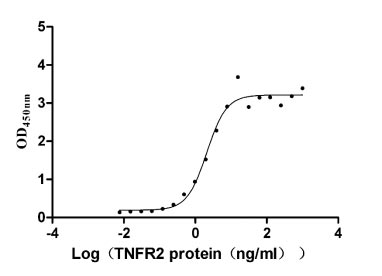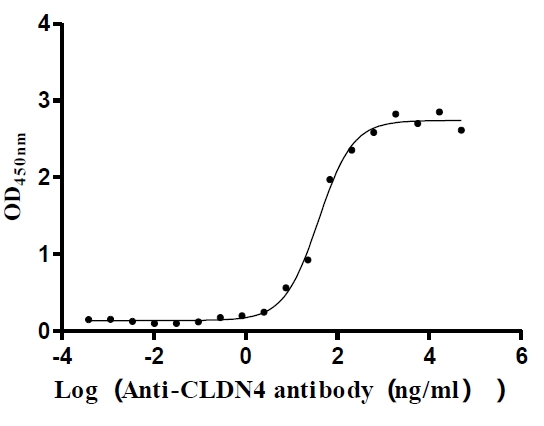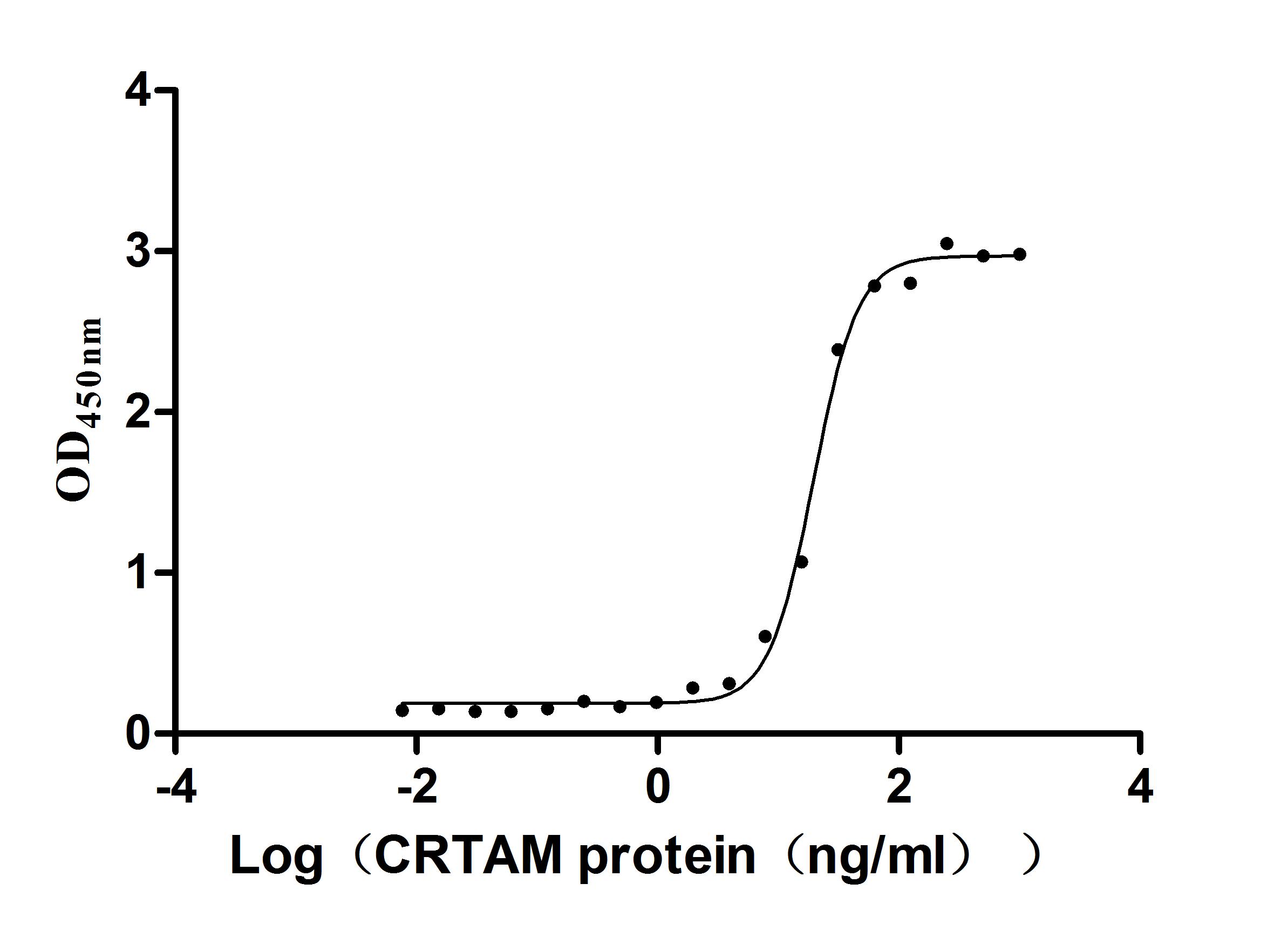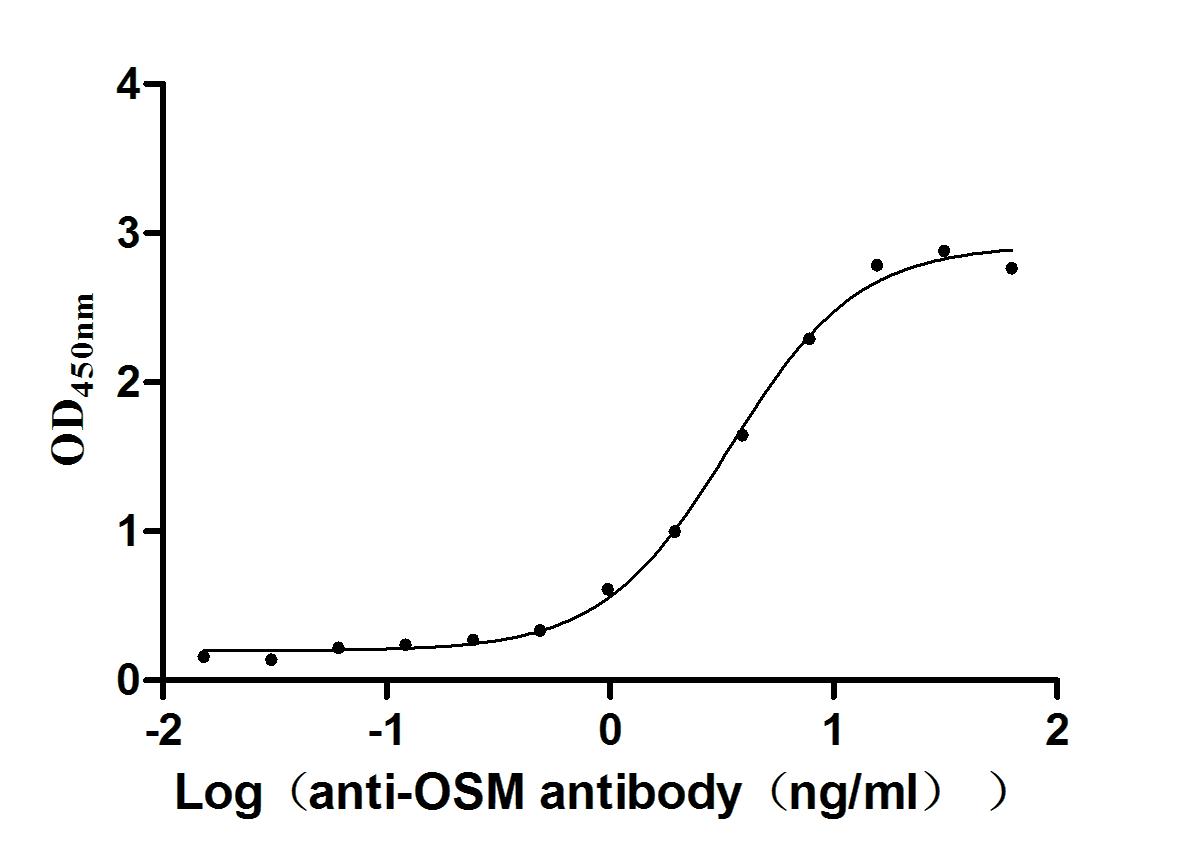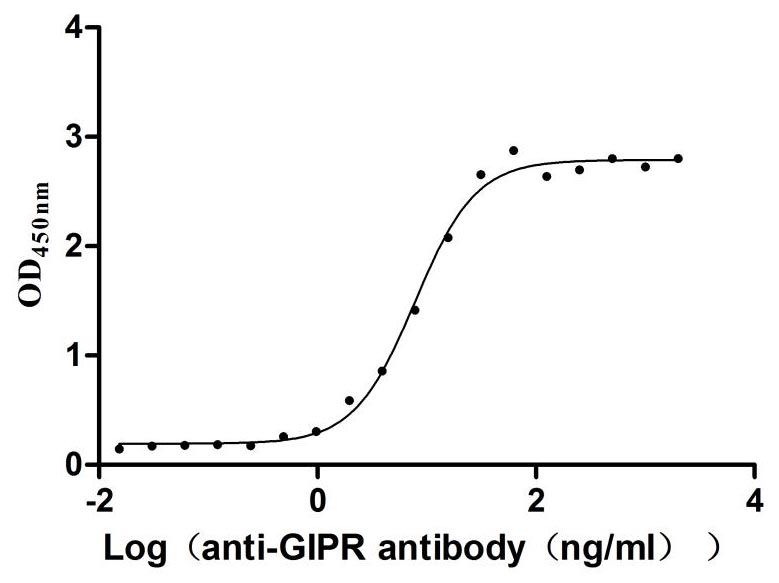Recombinant Human Plakophilin-2 (PKP2), partial
-
中文名称:人PKP2重组蛋白
-
货号:CSB-YP859116HU
-
规格:
-
来源:Yeast
-
其他:
-
中文名称:人PKP2重组蛋白
-
货号:CSB-EP859116HU
-
规格:
-
来源:E.coli
-
其他:
-
中文名称:人PKP2重组蛋白
-
货号:CSB-EP859116HU-B
-
规格:
-
来源:E.coli
-
共轭:Avi-tag Biotinylated
E. coli biotin ligase (BirA) is highly specific in covalently attaching biotin to the 15 amino acid AviTag peptide. This recombinant protein was biotinylated in vivo by AviTag-BirA technology, which method is BriA catalyzes amide linkage between the biotin and the specific lysine of the AviTag.
-
其他:
-
中文名称:人PKP2重组蛋白
-
货号:CSB-BP859116HU
-
规格:
-
来源:Baculovirus
-
其他:
-
中文名称:人PKP2重组蛋白
-
货号:CSB-MP859116HU
-
规格:
-
来源:Mammalian cell
-
其他:
产品详情
-
纯度:>85% (SDS-PAGE)
-
基因名:
-
Uniprot No.:
-
别名:ARVD 9; ARVD9; PKP 2; PKP2; PKP2_HUMAN; Plakophilin-2; Plakophilin2
-
种属:Homo sapiens (Human)
-
蛋白长度:Partial
-
蛋白标签:Tag type will be determined during the manufacturing process.
The tag type will be determined during production process. If you have specified tag type, please tell us and we will develop the specified tag preferentially. -
产品提供形式:Lyophilized powder
Note: We will preferentially ship the format that we have in stock, however, if you have any special requirement for the format, please remark your requirement when placing the order, we will prepare according to your demand. -
复溶:We recommend that this vial be briefly centrifuged prior to opening to bring the contents to the bottom. Please reconstitute protein in deionized sterile water to a concentration of 0.1-1.0 mg/mL.We recommend to add 5-50% of glycerol (final concentration) and aliquot for long-term storage at -20℃/-80℃. Our default final concentration of glycerol is 50%. Customers could use it as reference.
-
储存条件:Store at -20°C/-80°C upon receipt, aliquoting is necessary for mutiple use. Avoid repeated freeze-thaw cycles.
-
保质期:The shelf life is related to many factors, storage state, buffer ingredients, storage temperature and the stability of the protein itself.
Generally, the shelf life of liquid form is 6 months at -20°C/-80°C. The shelf life of lyophilized form is 12 months at -20°C/-80°C. -
货期:Delivery time may differ from different purchasing way or location, please kindly consult your local distributors for specific delivery time.Note: All of our proteins are default shipped with normal blue ice packs, if you request to ship with dry ice, please communicate with us in advance and extra fees will be charged.
-
注意事项:Repeated freezing and thawing is not recommended. Store working aliquots at 4°C for up to one week.
-
Datasheet :Please contact us to get it.
相关产品
靶点详情
-
功能:May play a role in junctional plaques.
-
基因功能参考文献:
- Comparative analyses of the influenza-host protein interactomes identified PKP2 as a natural inhibitor of influenza A viruses polymerase complex. PMID: 28169297
- Results identified common and rare variants within plakophilin 2 protein (PKP2) to be associated with left ventricular mass (LVM). PMID: 29288195
- Our study describes various clinical parameters in ACM patients and a recessive plakophilin 2 mutation after a limited PKP2 gene sequencing. PMID: 29961461
- Authors show that the PKP2 gene encoding the desmosomal protein Plakophilin-2 is a novel direct transcriptional target of Wnt/beta-catenin in normal and colon cancer-associated fibroblasts. PMID: 29044515
- Human iPSC line was generated from patient-specific adipose tissue-derived mesenchymal multipotent stromal cells carrying two mutations in plakophilin-2 (PKP2) gene using non-integrative reprogramming method. PMID: 29034900
- The rare incidence of PKP2 mutation in sudden unexplained noctural death syndrome (SUNDS, 1%) supports the previous viewpoint that SUNDS is most likely an allelic disorder as Brugada syndrome PMID: 27122407
- Up-regulation of plakophilin-2 (PKP2) is correlated with the progression of glioma. Study uncovers a potential role for PKP2 in the pathogenic process of glioma, suggesting that PKP2 may be a promising therapeutic target of glioma. PMID: 28124385
- Screening for CNVs in desmosome genes is useful to identify the genetic basis of disease in clinically suspected ARVC patients. PMID: 28431057
- a novel homozygous Plakophilin 2-gene mutation has a role in advanced cardiomyopathy PMID: 29253866
- An intronic mutation of c.2577+1G>T in the PKP2 gene causes a nonsyndromic form of Arrhythmogenic Right Ventricular Cardiomyopathy without cutaneous Involvements. PMID: 28523642
- Data show that fetal pMSCs (mesenchymal stromal cells) expressing the highest levels of desmoglein 2, desmocollin 3 and plakophilin 2, followed by maternal pMSCs, while bmMSCs expressed the lowest levels. PMID: 28154962
- Results show the involvement of plakophilin 2 protein (PKP2) in two siblings with severe cardiomyopathy with ventricular non compaction. PMID: 27030002
- PKP2 c.419C>T did not associate with heart failure, arrhythmias, or premature death, with ARVC or HCM/DCM, or with effects in vitro, suggesting that this is not a disease-causing variant. PMID: 26264440
- Family members - desmosomal mutation carriers who restricted exercise at or below the upper bound of the American Heart Association goal were less likely to be diagnosed and had no Ventricular Tachycardia. PMID: 26321091
- Extreme variability in clinical penetrance for a splice-site PKP2 mutation was found in a Bangladeshi family. Some family members were affected by arrhythmogenic right ventricular cardiomyopathy, and some are asymptomatic. PMID: 25786693
- Data suggest juxtamembrane regions/domains of desmocollin-2 (DSC2), plakophilin 2 (PKP2), and plakophilin 3 (PKP3) are involved in desmosome formation in epithelial cells; DSC2 participates in desmosome formation in absence of desmoglein 2 (DSG2). PMID: 25972099
- Plakofilin2 mutation plays an important role in the pathogenesis of Brugada syndrome. PMID: 25889434
- PKP2 regulates Wnt activity during adipogenic and cardiomyogenic differentiation in arrhythmogenic right ventricular cardiomyopathy. PMID: 26995964
- Currently, 13 genes have been associated with the disease but nearly 40 % of clinically diagnosed cases remain without a genetic diagnosis. PMID: 25398255
- A heterozygous pathogenic variant in the plakophilin-2 (c.2392A>G, p.T798A) gene was found in an arrhythmogenic LV cardiomyopathy patient and his deceased mother who had had arrhythmogenic cardiomyopathy affecting both ventricles. PMID: 26260507
- Six variants of uncertain clinical significance in the PKP2, JUP, and DSG2 genes showed a deleterious effect on mRNA splicing, indicating these are ARVD/C-related pathogenic splice site mutations. PMID: 25087486
- Exercise test is valuable for the diagnosis of ARVC in patients with PKP2 gene mutation. PMID: 25936878
- Case Report: PKP2/DSP mutations in patient with Brugada syndrome and ventricular tachycardia. PMID: 25900994
- The introduction of the PKP2 R735X mutation into mice resulted in an exercise-dependent arrhythmogenic right ventricular cardiomyopathy. PMID: 25857910
- PKP2 haploinsufficiency contributes to pathogenesis in arrhythmogenic cardiomyopathy. PMID: 24704780
- mutations in PKP2 are associated with a later age of onset of arrhythmogenic right ventricular cardiomyopathy PMID: 24967631
- PKP2 is a novel activator of the EGFR signaling pathway. PMID: 25113560
- Missense mutations in plakophilin-2 cause sodium current deficit and associate with a Brugada syndrome phenotype. PMID: 24352520
- The copy number variations analysis identified a heterozygous deletion of about 122 kb on chromosome 12p11.21, including the entire plakophilin-2 gene and shared by all affected family members. PMID: 23486541
- Downstream Hippo molecules STE20-like protein kinases 1/2, large tumor suppressor kinases 1/2, and Yes-associated protein (YAP, the effector of the pathway) are phosphorylated, offering novel mechanisms for arrhythmogenic cardiomyopathy pathogenesis. PMID: 24276085
- These data uncover a potential role for PKP2 upstream of beta1 integrin and RhoA in integrating cell-cell and cell-substrate contact signaling in basal keratinocytes. PMID: 23884246
- Of a total of 715 Sudden cardiac death cases, seven (1.0%) carried one of the ten mutations assayed: three carried KCNH2 R176W, one KCNH2 L552S, two PKP2 Q59L, and one RYR2 R3570W. PMID: 23651034
- PKP2 gene mutation is associated with arrhythmogenic cardiomyopathy in a large Dutch family. PMID: 23270881
- Results show that PKP2 mutations are insufficient to cause ARVD due to variable expression and incomplete penetrance PMID: 23147395
- haploinsufficiency is the most likely cause for the genesis of dominant arrhythmogenic right ventricular cardiomyopathy due to mutations in PKP2 PMID: 22781308
- While many of the reported ARVC mutations are truncating mutations, the possibly damaging variant found in this family, is a missense alteration affecting a highly conserved residue 506 located in exon 7. PMID: 22170284
- The authors report on a pedigree of cases involving a mutation in the plakophilin 2 gene that was associated with the development of arrhythmogenic right ventricular cardiomyopathy. PMID: 22035158
- PKP2 mutations are not specific for arrhythmogenic right ventricular cardiomyopathy and may result in sudden unexpected death with negative autopsy. PMID: 22019812
- PKP2 gene upregulation is associated with bladder cancer invasion. PMID: 22119253
- PKP2A was shown to be the major isoform expressed in human heart tissue and PKP2B protein was undetectable; results strongly suggest that p.Arg490Trp and other variants located in PKP2 exon 6 may not be disease causing PMID: 21378009
- Mutant plakophilin-2 proteins were unable to disrupt established desmosomes when expressed in an E-cadherin-expressing epithelial cell model; they were unable to initiate de novo assembly of desmosomes in an N-cadherin-expressing epithelial cell model. PMID: 19533476
- Studies identified two mutations in DSG2, four in DSC2, two in DSP, four in JUP and seven in PKP2. PMID: 20864495
- Adherens junctions connecting cardiac myxoma cells show exactly such general acquisition of Pkp2. PMID: 20693980
- Data suggest that PKP2 may functionally link RhoA- and PKC-dependent pathways to drive actin reorganization. PMID: 20554761
- Reduced connexin43 expression and localization to the intercalated disk occurs in heterozygous human PKP-2 mutations, potentially explaining the delayed conduction and propensity to develop arrhythmias seen in this disease. PMID: 18662195
- Fifteen percent of Danish arrhythmogenic right ventricular cardiomyopathy/dysplasia patients carried PKP2 mutations. PMID: 19955750
- mutations in plakophylin-2 (PKP2) gene in ARVC PMID: 19880068
- Protein binding and functional characterization of plakophilin 2. Evidence for its diverse roles in desmosomes and beta -catenin signaling PMID: 11790773
- In 32 of 120 unrelated individuals with ARVC, we identified heterozygous mutations in PKP2, which encodes plakophilin-2, an essential armadillo-repeat protein of the cardiac desmosome. PMID: 15489853
- mutations in the desmosomal plakophilin-2 gene can cause arrhythmogenic right ventricular cardiomyopathy PMID: 16415378
显示更多
收起更多
-
相关疾病:Arrhythmogenic right ventricular dysplasia, familial, 9 (ARVD9)
-
亚细胞定位:Nucleus. Cell junction, desmosome. Note=Nuclear and associated with desmosomes.
-
蛋白家族:Beta-catenin family
-
组织特异性:Detected in heart right ventricle (at protein level). Widely expressed. Found at desmosomal plaques in simple and stratified epithelia and in non-epithelial tissues such as myocardium and lymph node follicles. In most stratified epithelia found in the des
-
数据库链接:
Most popular with customers
-
Recombinant Human Lymphotoxin-alpha (LTA) (Active)
Express system: Mammalian cell
Species: Homo sapiens (Human)
-
Recombinant Human Claudin-4 (CLDN4)-VLPs (Active)
Express system: Mammalian cell
Species: Homo sapiens (Human)
-
Recombinant Human Cell adhesion molecule 1 (CADM1), partial (Active)
Express system: Mammalian cell
Species: Homo sapiens (Human)
-
Recombinant Human Oncostatin-M (OSM), partial (Active)
Express system: Mammalian cell
Species: Homo sapiens (Human)
-
Recombinant Rat Gastric inhibitory polypeptide receptor (Gipr), partial (Active)
Express system: Mammalian cell
Species: Rattus norvegicus (Rat)
-
Recombinant Human Cadherin-6(CDH6),partial (Active)
Express system: Mammalian cell
Species: Homo sapiens (Human)
-
Recombinant Human Urokinase-type plasminogen activator(PLAU) (Active)
Express system: Mammalian cell
Species: Homo sapiens (Human)


